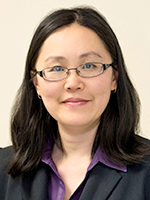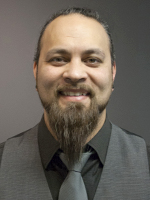
"I say yes to participating in research because the more data researchers have the more they can help patients.”
– Jonathan dela Cruz, Burnaby
Jonathan dela Cruz relies on his voice around the clock. By day, dela Cruz works the phones as a customer support representative for a marketing firm. By night, he is a singer. But last year, the 38-year old father from Burnaby tore his vocal chords and was unsure if he’d ever be able to sing again. “That unknown was freaking me out,” says dela Cruz. “Meeting with a specialist and finding out there was a procedure to save my voice was a huge relief.”
dela Cruz had vocal surgery with Vancouver Coastal Health Research Institute scientist and surgeon Dr. Amanda Hu. dela Cruz says his voice is better now than before. “The surgery was a lifesaver for me. Being able to communicate with customers and trainees is crucial to my day-to-day work.” As for his singing, dela Cruz is back on stage with his progressive metal band Dark Sun Profits.
“It’s pretty labour intensive! I’m usually singing, rapping and screaming, sometimes in the same song. My voice has to be in top shape.”
Following his successful surgery, dela Cruz was more than happy to participate in a research study Dr. Hu, from the University of British Columbia in Vancouver, along with colleagues at the University of Washington in Seattle, was conducting to measure the impact of voice disorders on work productivity. dela Cruz was one of 174 patients who filled out an online questionnaire about their productivity at work.

In her practice Dr. Hu treats a wide range of people who need their voice for employment. She notes that a quarter of all occupations require a healthy voice and a frequent amount of speaking. “I see a lot of teachers and lawyers, even call-centre workers who are on the phone day in and day out. Some of my patients have to go on disability because they lose their voice entirely.”
"Voice disorders are often ignored because patients are still physically able to go to work. However, their productivity can be severely impacted," says Dr. Hu.
Hu’s questionnaire contributed to the development of a new assessment tool. The Work Hoarse assessment asks patients to rank whether hoarseness or vocal pain affected their work. For instance, did they speak less in meetings or on the phone, were they absent more than other workers? Hu says having a measurement tool to quantify lost productivity could help workers get support for accommodations, such as voice amplifiers. The tool will help employers too. Hu says most employers want to help their staff work to their full potential.
In dela Cruz’s case, he was able to get support at work when his vocal chords were damaged.

Hu says the Work Hoarse assessment tool will benefit practitioners too. “I often get requests from patients to support their disability claim and sometimes I am unsure if the claim is valid. A tool like this will allow me, and other health care professionals, to determine which patients are eligible for support.”
Hu plans to submit the Work Hoarse tool for publication and review. She hopes it will be adopted by other clinics and become part of the initial screening for patients with voice disorders.
THIS IS ONE PATIENT’S STORY OF PARTICIPATING IN A CLINICAL TRIAL. YOUR EXPERIENCE MAY DIFFER. LEARN MORE ABOUT CLINICAL TRIALS BEFORE PARTICIPATING.


